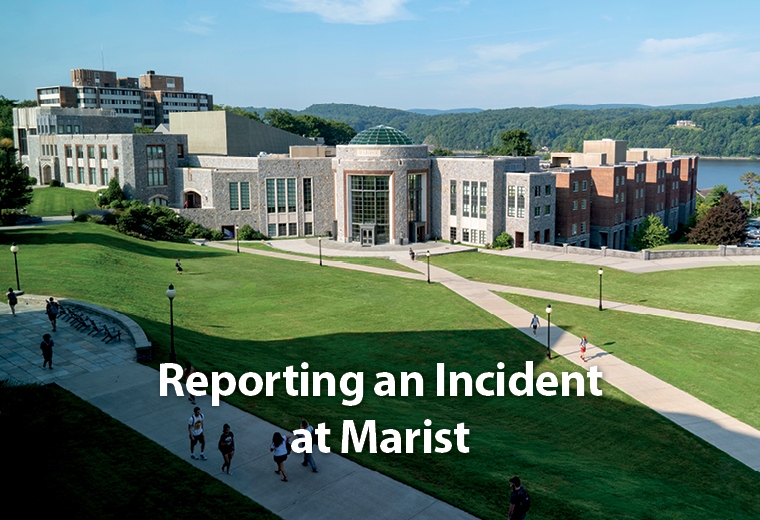Q: Will the information I share about sexual assault be kept confidential?
A: Confidentiality depends upon whom a complainant chooses to speak with about the incident. Members of the Marist community have two types of resources available to them: Confidential and Non-Confidential.
Confidential Resources. Communications with some individuals are considered confidential. This means that any information shared by the reporting party with a specific individual will not be used against them in the Title IX process.
Students should always confirm whether confidentiality applies to the communication. Confidentiality applies when a student seeks services from the following persons/offices on campus:
- Counseling Service
- Health Services
- Ordained Clergy
Off-campus confidential resources include:
- Victim Advocate
- Family Services
- Personal Attorney
Non-Confidential Resources
A College employee cannot guarantee complete confidentiality, but the individual can guarantee privacy. College employees—except as noted above—are required to share disclosures of policy violations to the Title IX Office. Information is disclosed only to select officials who have an essential need to know in order to carry out their responsibilities.
As is the case with any educational institution, the College must balance the needs of the individual student with its obligation to protect the safety and well-being of the community at large. Therefore, depending on the seriousness of the alleged incident, further action may be necessary, including a campus security alert. The alert, however, would never contain any information identifying the student who brought the complaint.
Q: If my report of sexual misconduct involves alcohol use, will I be punished?
A: While the College does not condone violations of its policies, reporting incidents of sexual misconduct is important. Thus, the College will not pursue disciplinary action against any person for possession or consumption of alcohol or drugs when that possession or consumption is revealed in the course of a good faith report of sexual misconduct or other good faith statements made in connection with an investigation.
Q: What options do I have for reporting sexual misconduct?
A: Marist is committed to creating an environment that encourages students to come forward if they have experienced any form of sexual misconduct.
There are two types of reports. Anyone can report an incident using the College’s form; these reports can be anonymous. A formal complaint is another type of report that is made specifically to the Title IX Office. Reports made to the Title IX Office may or may not result in an investigation.
In addition to supporting individual students affected by sexual misconduct, the College takes all incidents seriously and has a responsibility to address misconduct. When sexual misconduct involves criminal behavior, students are strongly encouraged to report the situation to law enforcement. The College will assist the student in notifying local law enforcement if the student so requests. An incident can be reported even if the student has not decided whether to take legal action. Nonetheless, students are always free to report and are encouraged to share instances of such behavior with the Title IX Coordinator, Safety & Security, Vice President of Student Affairs, and Office of Student Conduct regardless of whether or not they choose to press formal criminal charges with law enforcement.
Students are strongly encouraged to report incidents of, or share information about, sexual misconduct as soon as possible. This is true even if the student with a complaint or a witness may have concern that his or her own alcohol or drug use, or other prohibited conduct were involved. Again, the College will not pursue disciplinary violations against a student with a complaint or a witness for their improper use of alcohol or drugs if the student is making a good faith report of sexual misconduct.
The College can take action only if the College is made aware of the behavior. If a College administrator becomes aware of a complaint or other violation of this policy, the administrator should bring the information to the Title IX Coordinator so that concerns are heard and services can be offered to the reporting party.
Q: Is there a time limit to make a report or file a formal complaint? What offices should be contacted?
A: The College strongly encourages prompt reporting of complaints and information rather than risking any student's well-being. Although there is no time limit on the reporting of formal charges with the College, the College may ultimately be unable to adequately investigate if too much time has passed or if the accused student has graduated. Factors that could negatively impact the College's ability to investigate include the loss of physical evidence (e.g., prompt medical examinations are critical to preserving the physical evidence of sexual assault), the potential departure of witnesses, or loss of memory.
The College strongly encourages students to report concerns to either or both of the following offices:
- For emergencies, contact 911. For non-emergencies, or if criminal behavior is involved, students are encouraged to contact the Police by telephone at:
- 845-485-3666 (Town of Poughkeepsie Police Department)
- 845-451-4000 (City of Poughkeepsie Police Department)
Contacting the police does not mean you must pursue charges. The police can advise you of your options and can also preserve evidence while you consider your options.
- To seek assistance and support, or to report misconduct, contact the Title IX Coordinator (845-575-2210)
- In all situations, the College's goal is to treat the student who reports misconduct with sensitivity and fairness, while also ensuring the accused individual receives due process if any disciplinary action is to be imposed.
- Student Affairs staff members are available to a student with a complaint if the student would like assistance throughout any College investigation or adjudication process. This staff member is not an "advocate" as that term is used nor is that staff person a representative who will speak on behalf of the student in any investigatory or adjudication process. Rather, the staff member serves as an "advisor," a point of contact to answer questions and explain processes, join the student in meetings, and make sure the student's expressed needs are being addressed.
- For complaints against other students, faculty, or staff the Discrimination, Harassment, and Sexual Misconduct policy and procedure will govern the process.
- In situations where a responding party faces both a disciplinary complaint and a criminal charge, the College reserves the right to move forward with an investigative and adjudication process at the same time the criminal process is proceeding.
Q: What happens after I file a report? Will the Title IX Office communicate with me?
A: Once the Title IX Office receives a report, a staff member will reach out to the Complainant (the person who has been victimized) and offer resources and options available on campus and in the community. Individuals are not obligated to communicate with the Title IX Office. If a report results in an investigation, both the Complainant and Respondent will be provided with written notice of the initiation of each major stage of the investigative process. This includes, but is not limited to, a notice of investigation, informing parties when investigators are meeting with the other party, when interviews have concluded, and when a preliminary report is completed.
Q: What are the benefits of reporting a sexual assault to the police?
A: Contacting the Police does not mean you must pursue charges. The Police can advise you of your options and can also preserve evidence while you consider your options. The Police can also advise you on safety planning techniques.
For emergencies, contact 911. For non-emergencies students are encouraged to contact the Police by telephone at:
- 845-485-3666 (Town of Poughkeepsie Police Department)
- 845-451-4000 (City of Poughkeepsie Police Department)
Q: Does it make a difference if the sexual misconduct occurs on or off campus?
A: No. According to the College's policy and procedures, under the grievance section it is defined that sexual misconduct, sexual assault, sexual exploitation, dating violence, domestic violence, and stalking covers both on-campus and off-campus conduct, as those terms are described below.
On-Campus Violations
The campus includes the geographic confines of the College, including its land, institutional roads and buildings, its leased premises, common areas at leased premises, the property, facilities and leased premises of organizations affiliated with the College, such as the Student Union or College housing. College housing includes all types of College residence housing such as halls and apartments. Unrecognized housing includes fraternity and sorority chapter dwellings.
Off-Campus Violations
Students should be aware that off campus violations that affect a clear and distinct interest of the College are subject to disciplinary action. As examples, sexual misconduct and harassment are within the College's interests when the behavior:
- Involves conduct directed at or by a College student, employee, or other member of the College community (e.g., private house party, utside employment);
- Occurs during College-sponsored events (e.g., field trips, social or educational functions, College-related travel, student recruitment activities, internships and service learning experiences);
- Occurs during the events of organizations affiliated with the College, including the events of student organizations;
- Occurs during a Study Abroad Program or other international travel; or
- Poses a disruption or threat to the College community.
Q: Why should I seek medical attention when I haven't decided whether I want to report the assault to the police or the College?
A: Seeking medical attention can help you in many ways. First, seeking medical attention can help you take care of your own health by checking for injuries, treating those injuries, and addressing the possibility of sexually transmitted infections (STIs) and pregnancy.
Second, a forensic medical exam can preserve evidence of the assault. This is important even if you are currently undecided about your next steps because you may later decide to pursue criminal charges or College disciplinary charges - that evidence can help in both situations. A medical exam is not, however, required before pursuing criminal or College disciplinary charges.
In Dutchess County, New York, initial medical exams are free for a person who has been sexually assaulted.
Q: Where can I find information about safety and crime statistics for the College?
A: The purpose of the Annual Security & Fire Safety Report is to provide our faculty, staff, students, and visitors with campus security and safety information in order that their experiences at Marist College may be safe and enjoyable. It has been prepared by the Marist College Safety & Security Department and anyone with questions pertaining to this report, or any security-related issue or concern, should contact the Director of Safety & Security at (845) 471-1822.
This report is filed as required by the federal “Crime Awareness and Campus Security Act,” (hereafter referred to as the Campus Safety Act) which was last amended in 1998. The report also includes reporting requirements mandated by the Higher Education Opportunity Act (HEOA) of 2008 and the Violence Against Women Reauthorization Act (VAWA) of 2013. Collectively, the laws require that Marist College prepare and publish both an Annual Security Report and an Annual Fire Safety Report. Marist incorporates both reports into one main report called the Annual Security & Fire Safety Report. The laws are designed to provide individuals with a better understanding of campus security and safety issues so that they may make informed decisions. Marist has taken a proactive approach to campus security and safety, is in full compliance with all laws applicable to campus safety, and is pleased to prepare, publish and distribute this report to all current students and employees. This report is also available to any applicant for enrollment or employment at Marist College.







